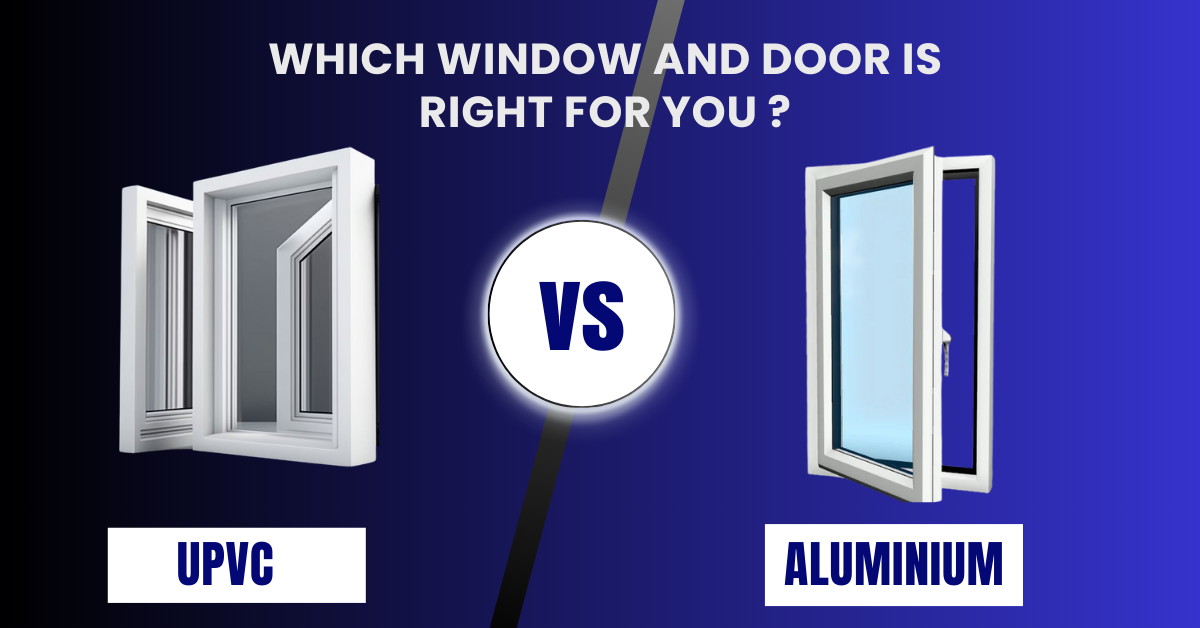Durability and Longevity
- Aluminum: Known for its exceptional durability and strength, aluminum frames can withstand harsh weather conditions and require minimal maintenance. They are resistant to corrosion, rust, and warping, ensuring a long lifespan.
- uPVC: uPVC (Unplasticized Polyvinyl Chloride) is also highly durable and resistant to various weather elements. It won't rot, rust, or corrode, making it a low-maintenance option. While not as strong as aluminum, uPVC offers excellent longevity.
Energy Efficiency
- Aluminum: Aluminum is a good conductor of heat, which can lead to energy loss, especially in colder climates. However, modern aluminum frames are often designed with thermal breaks to improve insulation.
- uPVC: uPVC is an excellent insulator, providing superior thermal performance. It effectively reduces heat loss in winter and heat gain in summer, leading to significant energy savings and lower utility bills.
Aesthetics and Customization

- Aluminum: Aluminum frames offer a sleek, modern look and can be customized with various finishes, including powder coating and anodizing. They are available in a wide range of colors and styles to complement any architectural design.
- uPVC: uPVC frames are available in a variety of styles, colors, and finishes to match different aesthetic preferences. While they may not offer the same level of customization as aluminum, they can still provide a stylish and elegant appearance.
Security
- Aluminum: Aluminum frames are robust and can be reinforced with additional security features like multi-point locking systems and reinforced glass.
- uPVC: uPVC frames can also be equipped with advanced security features, including multi-point locking systems and high-security hardware.
Cost
- Aluminum: Aluminum frames tend to be more expensive than uPVC frames due to the higher material cost and complex manufacturing process.
- uPVC: uPVC is a more cost-effective option, making it a popular choice for budget-conscious homeowners.
Quality and Performance of uPVC Windows and Doors

One of the key advantages of uPVC windows and doors is their exceptional quality and performance. Here's a closer look:
- Weatherproofing: uPVC is highly resistant to moisture, making it ideal for areas with high humidity or frequent rainfall. It prevents water infiltration, ensuring a dry and comfortable indoor environment.
- Sound Insulation: uPVC windows and doors provide excellent sound insulation, reducing noise pollution and creating a peaceful living space.
- Durability and Longevity: As mentioned earlier, uPVC is highly durable and requires minimal maintenance. It can withstand harsh weather conditions and retain its shape and color over time.
- Energy Efficiency: uPVC's superior thermal insulation properties contribute to significant energy savings. By reducing heat loss in winter and heat gain in summer, you can lower your energy bills and reduce your carbon footprint.
- Security: Modern uPVC windows and doors are equipped with advanced security features, such as multi-point locking systems and reinforced frames, to deter intruders and protect your home.
The Verdict: Why uPVC Often Wins
While aluminum offers durability and a modern aesthetic, uPVC often emerges as the superior choice for most homeowners due to its excellent energy efficiency, low maintenance, and cost-effectiveness. It provides a balance of style, performance, and affordability.
Ultimately, the best choice for your home will depend on your specific needs, budget, and personal preferences. Consider factors like your local climate, desired level of security, and aesthetic preferences when making your decision. Consulting with a window and door expert can also provide valuable insights and recommendations.
By carefully evaluating these factors, you can select the right window and door material to enhance your home's comfort, security, and energy efficiency.
